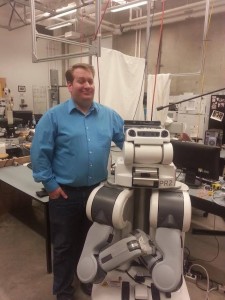Postdoc Talk Event: 8 July (7.30 PM), at the Railway Club
(all welcome, more details)
Postdoc Talk Title: Robot Self-Modeling and Self-Other Reasoning
Abstract:
Dr. Justin Hart’s research encompasses areas of artificial intelligence, computer vision, and human-robot interaction in which reasoning about the robot’s “self” plays an important role. Traditionally, robots do not learn about their selves. Knowledge of the robot’s body and senses typically comes from engineering drawings or external calibrations; a process that can cause problems that designers must work around. These robots learn and reason about the tasks that they perform, but the robot itself is often absent form this learning process.
This talk will discuss material from Justin Hart’s doctoral work, in which he designed a system that enables a robot to learn about its body and senses by using them in conjunction with each other. The robot constructs a unified “self-model,” which is inspired by the earliest forms of self-awareness learned in infancy.The robot is able to use its self-model to perform novel tasks such as inferring the visual perspective of a mirror.
The talk will also discuss Justin’s current postdoctoral research at the University of British Columbia, in which he is developing techniques to enable robots to perform self-other social reasoning. Such reasoning comes easily to humans (“He is looking at that.” “She intends to hand me the object.”), but is still remarkably difficult for robots to perform. Advances in self-other social reasoning will help to enable robots to work in roles where they must act as collaborators to human operators.
Biography:
Justin Hart is a postdoctoral fellow in the Collaborative Advanced Robotics and Intelligent Systems (CARIS) Laboratory in the Department of Mechanical Engineering at The University of British Columbia, where he is supervised by Professor Elizabeth Croft. At UBC, his research focuses on enabling humans and robots to effectively communicate and collaborate with each other. As part of this he is working on enabling machines to make inferences and predictions about human behavior, and to perform self-reflective reasoning processes in order to effectively collaborate on human-robot collaborative assembly tasks.
Dr. Hart received his Ph.D. in Computer Science from Yale University in November, 2014, where he was advised by Professor Brian Scassellati. For his dissertation, “Robot Self-Modeling,” he developed a system that enabled a robot to make inferences about its body and senses through data sampled during operation. This process is inspired by the process by which children learn about their sensory and physical capabilities and how they are able to interact with the environment; which represents one of the earliest forms of self-awareness to develop during infancy.
Dr. Hart’s work has appeared in New Scientist, BBC News, NBC News, Business Standard, CBS SmartPlanet, El Mundo, the Yale Graduate School Newsletter, GE’s Focus Forward Films, the Ideacity Conference, abd Creative Mornings: Vancouver, and received an award from the SME. More on information can be found at http://justinhart.net.
